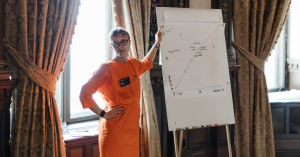“Thinking back to failures from our startup journey, I think hiring was the biggest point of failure so far. There are two ways in which you can go wrong with hiring. One is when you hire more than you need, and two is when you hire the wrong people,” shares Alex Govoreanu, CEO & Founder of Questo, a Romanian-born global platform where you can play, create and sell real-world city exploration games.
A well known statistic in the startup world is that 90% of startups, more or less, fail. But why? In this series, we aim to explore the most common reasons for which startups fail and share their lessons for future entrepreneurs wanting to beat the odds. Check out the first part of the series about the importance of doing your market research right.
Today, we’ll focus on another important reason for which startups may not survive their first two years: the failure to build the right team for the job, from the founding members to the operational staff. It’s not hard to understand why this happens often: founders are pressured by time and resource scarcity, and they may have zero prior entrepreneurship experience.
How to build a startup team
“A startup’s success is highly dependent on the team that is running it. A strong team with the right mix of skills, commitment, and experience can help a startup overcome many challenges. However, a weak team can lead to poor decision making, lack of focus, and ultimately failure,” Milen Ivanov, Managing Partner at Sofia Angels Ventures, believes.
The team running the startup is one of the firm’s most important pillars. As illustrated above, investors will judge the strength of a team by its commitment, experience, and mix of skills. Let’s look closer at each of these three aspects of how to build a startup team.
What is a red flag that the team is not committed enough to the mission of the startup and will likely not see it through?
“50% of the teams we see are not full-time and are doing this as a part-time job, which almost never works,” Milen says, adding: “Burning and big ambition is also something that we frequently lack in the team goals, which translates into difficulty to convince investors in the scaling of the business and also does not help in attracting great talent.”
Commitment and ambition often go hand in hand, as it can take a big goal to keep the founders motivated and present.
Even still, when prior entrepreneurship experience is missing, the journey gets a bit tougher, because running a startup is learned by doing, not from theory:
“First and foremost, prior experience is the most crucial factor for predicting founder success. Doing startups is highly experiential, which means that it’s something you can much less learn in theory than by doing. The chances of success are much higher when founders have prior startup experience, both of the successful kind and not,” says Max Gurvits, Managing Partner at Vitosha Venture Partners.
He continues: “I have successfully fundraised twice for my own companies, and have been on the other side of the table as an investor in close to 100 deals, and the one thing I have learned is that founders with prior experience get exponentially more interest – and better terms – than first-timers, because investors know that experienced founders are more likely to succeed”.
This doesn’t make it impossible to succeed from the first try, however, it makes the task of surrounding yourself with the right people, with complementary skills and expertise, even more important.
“The inability of founders to identify co-founders with complimentary skills to help them develop their business is one of the most common mistakes early stage startups make,” Mihai Guran, CEO, Guran Consulting Global and Vice-President, TechAngels Romania, points out.
This brings us back to Alex Govoreanu’s take that bad hiring can be one of the leading drivers of failure. What should you avoid doing if you are just starting out and looking to build your team?
First, if you are pushed by investors or external factors to hire more, know that you as decision makers need to analyze thoroughly your context and understand if by hiring you will actually accelerate the company or only its costs, Alex advises. Then, you need to monitor the results of the new hires diligently to ensure they perform accordingly, or otherwise, if you need to let them go.
Because in the end, it’s not uncommon to hire the wrong people, for various reasons:
“This can happen because you hire the CV, not the person, or because you hire under the pressure of time. We did both, and what we learned is that CVs do not accelerate our company, but people’s actions do. I don’t care if you previously worked at Google, if you don’t have the determination to come and work to make Questo a leading company, then there’s no reason for us to work together. As for hiring under time pressure, this has led to a few hires where our experience was telling us from the interview that the person is not right, but we skipped our instincts and decided to give it a try.”
Is that too much pressure on the founders? They are, in the end, the central piece around which the startup puzzle is built, Daniela Aldescu, Managing Partner at VERTIK, and Executive Director at Romanian Investor Relations Association (ARIR), believes.
“<The founder’s fault> comes from many reasons and usually is a cumulus of them – not assessing correctly the market demand for the product, not fully understanding what the product might be able to achieve in the market, the reluctance to ask and get feedback and/ or criticism on prototypes, lack of skills needed for the business and ability to onboard the suitable people and of course the inability to raise capital, to correctly position its equity story in front of the investors,” adds Daniela Aldescu.
Yet, the reverse is also true: the founders become the heroes when things go well:
“I saw in practice in the last years how a determined founder, one that is doing all necessary research, that correctly understands the process, the steps that a startup should undergo in order to develop correctly, can save a startup even when the times are challenging. The flexibility he or she poses is also key,” she adds.
All this said, is failure the worst that can happen to a founder? If gaining experience is what matters most and will be indicative of future successes, then no.
“Startups that fail have an important role in the overall ecosystem, as, usually, their founders will have learnt important lessons on how to lead, explore a new technology, and figure out how to solve hard problems. They will look for support, mentors, and entrepreneurial education when they will adventure in a new startup experience,” Daniela Aldescu concludes.








